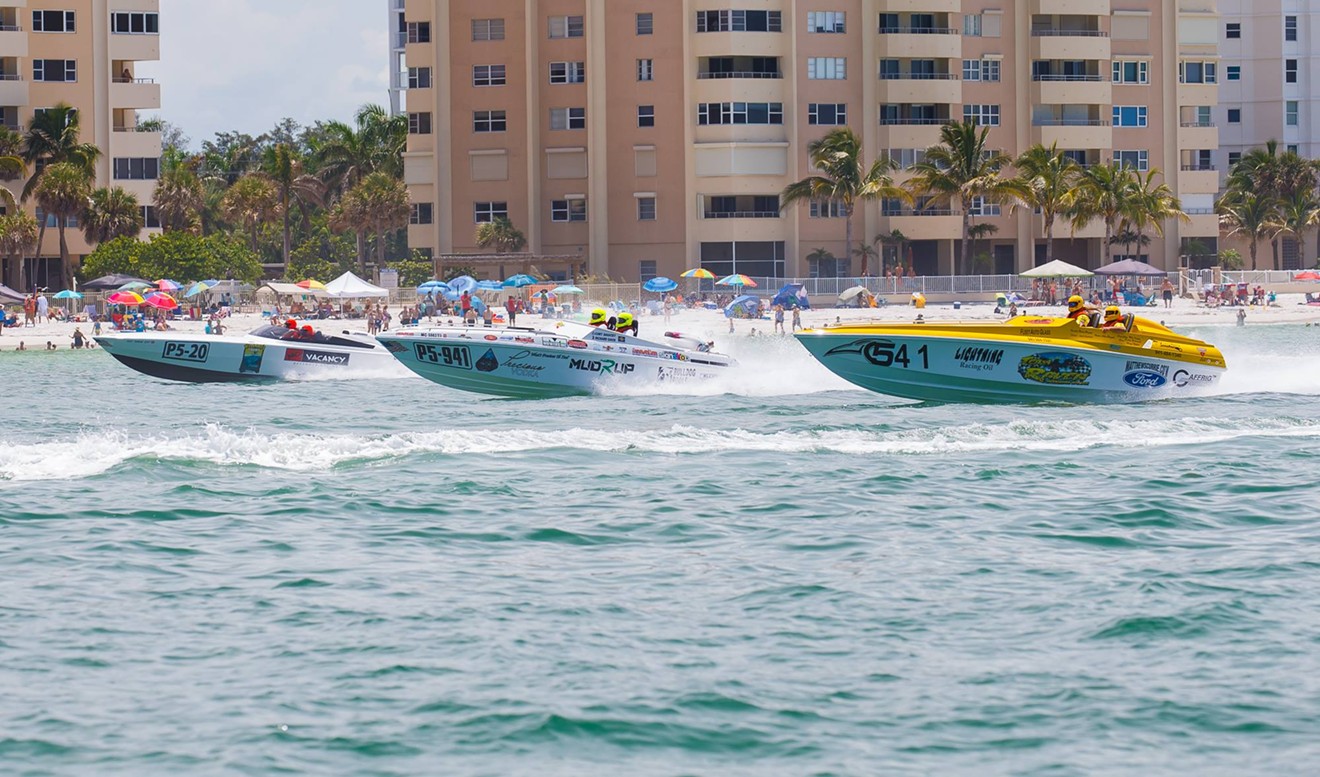Fishhead Demmer makes boats. Fast boats. The 60-something Pittsburgh native works as an engineer for a world-champion racing team in Riviera Beach. His team, a squadron of 12 guys of the extreme-sports variety, goes by the name Miss Geico — a girl-ified version of their sponsor, Geico. (“You always name a boat for a woman or a bird,” Fishhead says).
Most days, Fishhead, whose real name is Ed (he took up the moniker 30 years ago; his group of friends had four other Eds), works on power vessels. These slender watercraft are the Lamborghinis of the ocean: brightly colored, million-dollar boats that can move up to 75 mph on the open water. This week, Fishhead spent his time on a blue and yellow number — the boat his team will race this weekend in the P1 Superstock Grand Prix at Miami Marine Stadium.
Saturday and Sunday, Fishhead and Miss Geico will join professional powerboat and Jet Ski racers from around the world in Key Biscayne to face off in a massive televised water race. For most of the pros, the Grand Prix is just one of many races they run each year — a chance to get their boats into the water, make waves, and win. But for commuters, environmentalists, and Key Biscayne residents, it’s a nightmare of powerboats past.
This race marks an important sea change for local life. The 13-round Grand Prix will be the first major race at Miami Marine Stadium since the venue closed in 1992. Over the past few years, the stadium has slowly reopened to the public and, along the way, unearthed old resentments in the people who live nearby.
In 2015, for example, the Village of Key Biscayne sued the City of Miami after the city announced it would relocate the famous Miami Boat Show to Miami Marine Stadium. The village’s case lay in the city charter for the area, according to the Miami Herald. The area was designated for “parks and recreation,” and the residents claimed the commercial boat show did not qualify.
The argument hinged on zoning, but Sunny McLean, a retired retailer and 40-year Virginia Key resident, said the neighborhood had a laundry list of concerns. Among them: The boats are very fast. They are also very loud.
Fishhead’s team will race a model called a P1 Panther. It is roughly the size of a truck, emblazoned with the Geico logo, and — by Fishhead’s metrics — pretty slow. “Our big boat can do 4,000 horsepower,” he says. “This one here only does 300.”
For most people, though, 300 horsepower is nothing to sneeze at. The Panther usually cruises around 75 mph if the drivers knows what they’re doing. “These boats chase the birds away,” McLean says. “They disturb all the fish.”
Powerboats also take a well-documented toll on the environment and are particularly harsh on slow-moving manatees, which often get crushed by propellers or hulls. Just last year, speed boats killed 106 manatees in the state, according to the Florida Fish and Wildlife Conservation Commission. (“Yeah, I’ve probably driven over one or two without knowing it,” Fishhead says). And in the past decade, their population has plummeted.
The three-year legal battle between Key Biscayne and Miami ended earlier this month. A settlement stipulates traffic plans and environmental standards for any events at Marine Stadium.
Still, McLean says neighbors are wary of the boat races. “It appears that these race organizers have done everything that they’re supposed to do in consideration of the environment,” she says. “If there’s only one race a year, there probably won’t be much damage. But if there are more... then damage is going to occur.”
McLean says tensions between boaters and residents have risen in recent years. Just over a month ago, the head coach of the Miami Rowing Club, Cesar Herrera, had an altercation with a rider. He was out on the water with several students when a speedboat came close, creating a wake that disturbed the students. Herrera asked the rider to slow down. The rider pulled out a gun.
The races could make the situation worse, McLean says. “We feel this is going to introduce a community of small personal watercraft,” she says. “They will discover the Marine Stadium basin and say, ‘Oh, look at this, let’s go in and create wakes and make a lot of noise and disturb the water and possibly damage the environment.’”
Fishhead says the Miss Geico team is usually careful about surroundings. "But we are the biggest, baddest racers in the world," he adds. (The Miss Geico crew mates are ten-time world champions.) "We are rock stars."
[
{
"name": "Air - MediumRectangle - Inline Content - Mobile Display Size",
"component": "19274298",
"insertPoint": "2",
"requiredCountToDisplay": "2"
},{
"name": "Editor Picks",
"component": "17482312",
"insertPoint": "4",
"requiredCountToDisplay": "1"
},{
"name": "Inline Links",
"component": "18711090",
"insertPoint": "8th",
"startingPoint": 8,
"requiredCountToDisplay": "7",
"maxInsertions": 25
},{
"name": "Air - MediumRectangle - Combo - Inline Content",
"component": "17482310",
"insertPoint": "8th",
"startingPoint": 8,
"requiredCountToDisplay": "7",
"maxInsertions": 25
},{
"name": "Inline Links",
"component": "18711090",
"insertPoint": "8th",
"startingPoint": 12,
"requiredCountToDisplay": "11",
"maxInsertions": 25
},{
"name": "Air - Leaderboard Tower - Combo - Inline Content",
"component": "17482313",
"insertPoint": "8th",
"startingPoint": 12,
"requiredCountToDisplay": "11",
"maxInsertions": 25
}
]














